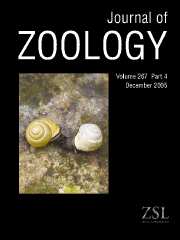Article contents
Lek-like mating in white-nosed coatis (Nasua narica): socio-ecological correlates of intraspecific variability in mating systems
Published online by Cambridge University Press: 19 January 2004
Abstract
The mating system displayed by a species or population is a complex result of interactions among many factors, including social organization and resource distribution. Lekking is rare among mammals, and despite decades of research and theoretical debate, there is still little agreement concerning the socio-ecological conditions that give rise to this mating system. This study documents a lek-like mating system in a population of white-nosed coatis Nasua narica: the first such system observed in a carnivore species. Male coatis in Tikal National Park, Guatemala, aggregated around mobile bands of females during the mating season. The males displayed from the forest canopy above the bands, and females ascended to a male's perch when they were ready to mate. Males did not provide resources or parental care. Thus, the mating system, which differed from classic lekking only in the lack of an arena, can be best described as mobile lekking. Male coatis apparently resort to self-advertisement when the large size and large home ranges of female groups make defence of females or resources impractical.
- Type
- Research Article
- Information
- Copyright
- 2004 The Zoological Society of London
- 6
- Cited by


